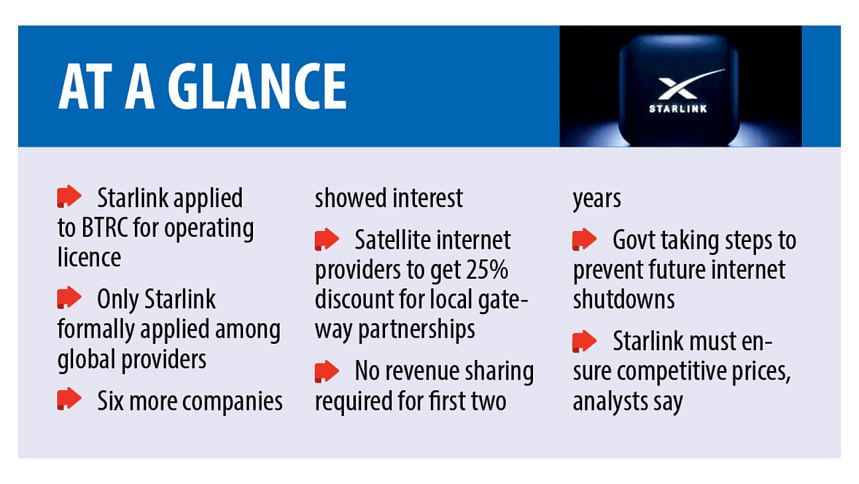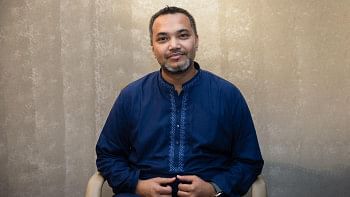Starlink applies for BTRC licence

Starlink has applied to the Bangladesh Telecommunication Regulatory Commission (BTRC) for a licence to operate in the country as both Elon Musk's company and the Bangladesh government look to facilitate the faster entry of satellite-based internet services.
"They already applied last week," Maj Gen Md Emdad Ul Bari, chairman of the BTRC, told The Daily Star yesterday, adding that due process would be followed in awarding the licence.
Earlier, on March 29, the US-based satellite internet service provider received approval from the Bangladesh Investment Development Authority (BIDA) to begin operations in the country.
The final hurdle for Starlink will be securing regulatory approval from the BTRC, the country's internet regulator.
If approved, Starlink will become the first company to receive a licence under the Non-Geostationary Orbit (NGSO) guidelines introduced on March 25.
According to the policy, the application and processing fee has been set at Tk 5 lakh, with a licence acquisition fee of $10,000 and an annual fee of $30,000.
Additionally, an annual station/terminal fee of $1 per terminal will be charged. However, no charges will apply for terminals used exclusively to provide IoT services.
Licensees will receive a 25 percent reduction in application, processing, acquisition, and annual licence fees if they connect their gateway through the government-owned International Internet Gateway (IIG) for bandwidth or form a partnership or joint venture with a Bangladeshi satellite company.
There will be no revenue-sharing obligation for the first two years. However, licensees will be required to share 3 percent of gross revenue from the third to the fifth year, and 5.5 percent from the sixth year onward.
In addition to the NGSO licence, companies like Starlink must also obtain a separate Radio Communications Apparatus Licence for non-geostationary orbit satellite services to access the necessary spectrum to launch their services.
In March, Chief Adviser Muhammad Yunus directed the authorities to ensure Starlink's commercial launch within 90 days.
BTRC Chairman Bari said that around half a dozen global satellite providers have expressed interest in offering satellite services in Bangladesh. However, so far, only Starlink has formally applied.
Starlink has been trying to enter the Bangladeshi market since 2021.
In April last year, BTRC approved the formation of a committee comprising officials from various divisions to draft guidelines for satellite-based internet services. The draft was completed in October 2024.
In the final guideline, satellite service providers were instructed to route internet traffic through local gateways and connect to an IIG for data transmission.
This provision allows the government to legally or technically suspend internet access if necessary.
However, the government is now taking steps to prevent internet shutdowns in the future.
Faiz Ahmad Taiyeb, special assistant to the chief adviser with executive authority to the Ministry of Posts, Telecommunications and IT, said the interim government does not intend to shut down the internet even for a moment and is working to prevent such shutdowns in the future.
Speaking at a seminar during a four-day investment summit in Dhaka, he outlined four steps the government is taking: recognising the internet as a citizen's right in the upcoming Cyber Security Ordinance, cancelling the standard operating procedure that allowed the ministry to initiate shutdowns, excluding shutdown provisions from NGSO licence guidelines, and amending telecom laws to eliminate the scope for future internet shutdowns.
Mustafa Mahmud Hussain, a telecom policy analyst, said Starlink's entry into Bangladesh marks a major step toward next-generation connectivity.
"However, pricing will be a critical factor for success in a market where local broadband is relatively affordable. To gain traction, Starlink must offer competitive rates."
Additionally, Bangladesh's weather conditions – frequent cloud cover and long monsoon seasons with heavy rainfall – demand consistent Quality of Service and Quality of Experience. The network must ensure strong performance and reliability, especially during the rainy months, to meet user expectations and sustain adoption, he added.

 For all latest news, follow The Daily Star's Google News channel.
For all latest news, follow The Daily Star's Google News channel. 








Comments